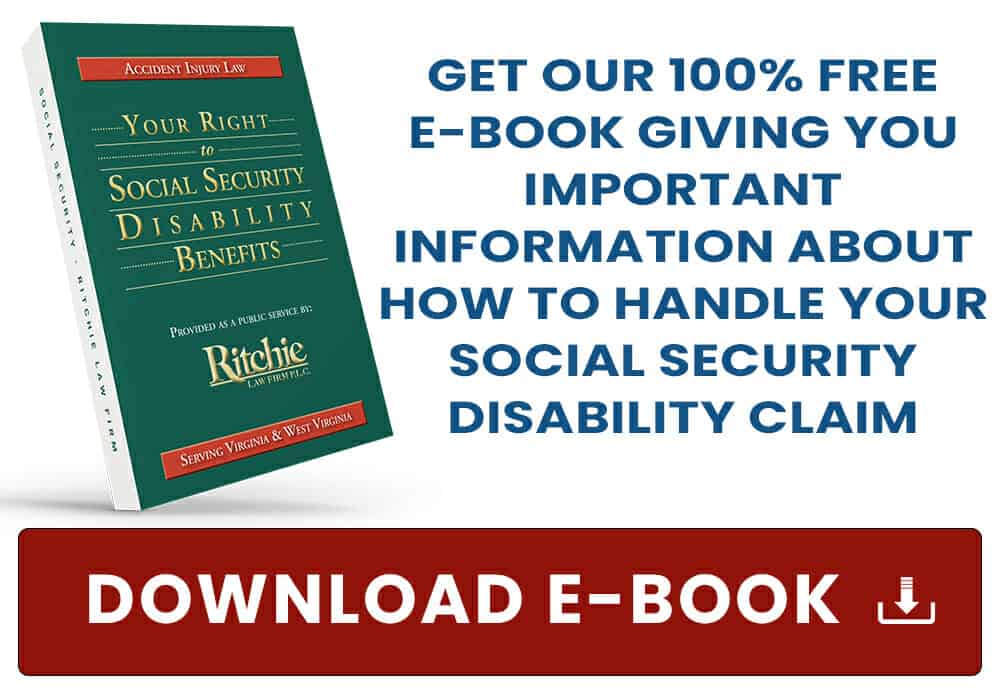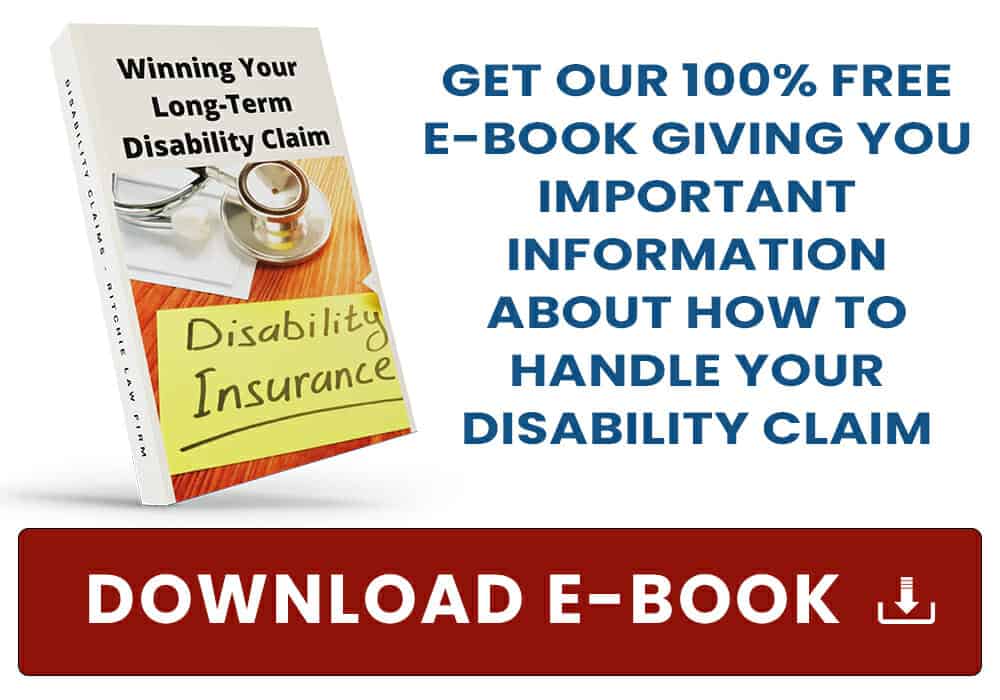Will You Qualify for Social Security Disability Benefits?
If you can’t work because of a physical or mental condition, you might be eligible for Social Security Disability benefits. But, before you will be awarded benefits, you must prove to the Social Security Administration (SSA) that you are “disabled.” To prove disability, you must meet the strict definition defined by Social Security law. The Ritchie Law Firm helps disabled workers obtain Social Security disability benefits throughout Virginia and West Virginia.
To decide whether you are disabled, the SSA uses a 5-step test. Each step presents a hurdle that you have to overcome to be awarded benefits. And, you have to clear every hurdle. At any step in this process, a “wrong” answer could derail your claim.
Will you qualify for Social Security disability benefits? Take our short quiz to find out:
-
Are you working? Yes/No
If you answered “yes,” you probably won’t qualify for Social Security disability benefits. But, having said that, not all work is created equal. For instance, if your work qualifies as “substantial gainful activity,” you will probably be barred from receiving disability benefits. Substantial gainful activity is work that requires significant physical or mental activity and for which you earn more than a minimum amount established by Social Security. If you are working and your work isn’t substantial gainful activity and you don’t earn the minimum required amount, you may be eligible.
If you answered “no” to this question, you have cleared the first hurdle and may be eligible for disability benefits.
2. Which of the following more accurately describes your situation:
- I have a short-term medical condition that makes it difficult (sometimes, impossible) for me to perform basic work-related activities.
- I have a medical condition that makes it impossible for me to do basic work-related activities, and my condition is expected to last for at least a year
If the first situation describes you best, you will probably not qualify for Social Security benefits. Social Security disability benefits are designed for people who have a severe physical or mental impairment preventing them from working. If your condition is only temporary, it will likely not be determined to be severe, in which case you won’t be eligible for Social Security disability benefits.
If the second situation describes you best, you have cleared the second hurdle.
3. Has your impairment been diagnosed and documented by a medical doctor? Yes/No
If you answered “yes,” great! But, the Social Security Administration will not just take your word for it. You need to give SSA proof that you have a “medically determinable” impairment. A medically determinable impairment is a physical or mental impairment that has been documented by medically accepted tests and diagnostic techniques. This usually means medical records that contain objective evidence like the results of your doctor’s or other licensed medical source’s examination of you, lab reports x-rays, etc.
If you answered “no,” without credible medical evidence from a licensed medical professional, your claim will likely be denied. But, you might be able to get this evidence — test results, examination reports, etc. — from a health care provider.
4. Is your condition listed in the Social Security Administration’s Listing of Impairments? Yes/No
If you answered “yes,” you may automatically qualify for Social Security disability benefits. The Listing of Impairments describes more than 100 physical and mental conditions that Social Security considers to be severe and disabling.
If you answered “no,” you are not automatically eligible for Social Security disability benefits. But, this does not mean an automatic denial of your claim. Even if your condition does not meet or equal a listing, you may still be able to qualify for benefits if you meet other vocational requirements.
5. Are you able to do any work you have done previously in the past 15 years? Yes/No
If you answered “yes,” you are likely not eligible for disability benefits.
If you answered “no,” you may qualify for Social Security disability benefits. The Social Security Administration will take a look at your work history to determine whether you are able to perform any of your “past relevant work.” Your past relevant work is any job you may have done in the past 15 years that required significant mental or physical activity, and that you performed long enough to master. If can can do any of these jobs, you may not be disabled. This hurdle can be a very difficult one to overcome. But if the Social Security Administration finds that you can’t do any of your past work, then you might qualify for benefits.
6. Are you able to do any other work? Yes/No
If you answered “yes,” even if you can’t do the work you’ve done previously, if you can do any other kind of work, you may not qualify for Social Security disability benefits. To make this decision, the Social Security Administration will decide what you are capable of doing with your disability. The SSA will also consider other factors such as your age, education, and transferable skills to determine whether you are capable of doing different work than what you’ve done in the past. At this stage, the only issue is whether you are able to work in any jobs and not whether you would actually be hired for those jobs.
7. Which of the following describes your present situation:
- I think I qualify for Social Security disability benefits, but I haven’t applied yet.
- I think I qualify for Social Security disability benefits, but my application was denied.
If you haven’t applied yet, you need to apply as soon as possible! There are three ways to apply: by telephone, online, and in person. At this time, the SSA is not taking applications in person because of COVID-19. To apply by phone, call the Social Security Administration at 800-772-1213. You will be given a date and approximate time to expect a phone call from someone at the Social Security office, who will take your application over the phone. The application will then be mailed to you for your signature. To apply online, go to www.ssa.gov/applyfordisability.
If your disability application has been denied, you must appeal within the timeline outlined in your denial letter. It is a good idea to contact an attorney experienced in handling Social Security disability claims to help you file your request for a hearing and to prepare you to testify. While you are not required to have an attorney represent you, your chances are greatly improved if you have a knowledgeable Social Security disability lawyer fighting for you.
What Makes Ritchie Law Firm Different?
Many Virginia lawyers say they practice Social Security Disability law. But, most of those lawyers have not had years of experience winning Social Security Disability cases. That’s what makes us different. At the Ritchie Law Firm, we have a team of lawyers who have the experience of handling Social Security Disability cases and WINNING. Sure, we also handle personal injury cases. But, Social Security Disability cases are a different beast. And, we know how to handle them.
If you have been denied Social Security Disability benefits, our disability team will review your denial letter for FREE. Then, with no obligation and NO STRINGS ATTACHED, we’ll tell you our game plan for winning your case.
If you want your disability case handled by a team of lawyers trained to handle this difficult area of the law that few lawyers know the first thing about, your search is over. Whatever stage of applying for benefits you are in, whether you haven’t yet applied or you’ve been denied, we are happy to help. Click here to give us some details about your case.
When Your Health And Family Are On the Line
We Go Into BATTLE for you!
You can talk to us for FREE.
Call today 800-277-6124, fill out the form below or
download our free ebook in the side panel.
800-277-6124



